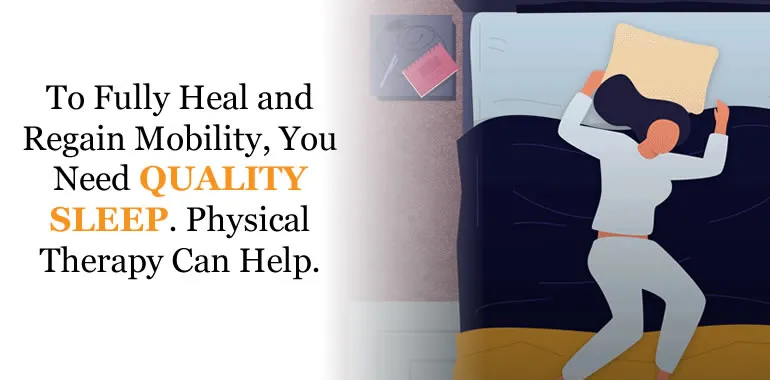To fully heal and regain mobility, you need QUALITY sleep. Physical therapy can help.
We help people heal from injuries every day. We monitor patterns and look for similarities in the people who have the best and worst results with physical therapy. One of the biggest variables that play a significant role in people’s ability to recover from injury, is whether or not they get high quality sleep. In this report I will be reviewing why sleep is so essential to health, I will share some reasons why people have trouble sleeping through the night or falling asleep and I will give tips on how to get high quality sleep.
People who don’t sleep enough have a lot of trouble healing from acute and chronic injury. I should mention that many times injuries go into the chronic stage due to the fact that the person is sleep deprived. I will share a personal experience in sleep deprivation. When I had my son I averaged 4 hours total interrupted sleep per day, including naps. Prior to this I was averaging 8-9 hours/night. So needless to say, my body was not happy. It is interesting to look back at that time now, much of it I just can’t recall. I had daily hallucinations, new and random phobias, daily headaches, body aches as well as generalized anxiety and depression. You could have called it postpartum depression, I decided to call it sleep deprivation. I’m only sharing this because I like to instill my deep and personal experience with sleep deprivation.
So Why Is Sleep So Critical To Health And Healing?
In recent studies, research has shown that losing sleep can disrupt the body’s pain signaling system and heighten a person’s sensitivity to pain. In one study on sleep deprived subjects, they showed a 24% decrease in musculoskeletal pain threshold.
According to the CDC, about 70 million Americans experience chronic sleep problems. Lack of sleep (or less than 7 hours) is associated with injuries, chronic diseases, mental illnesses, poor quality of life and well-being, increased healthcare costs, and lost work productivity. Sleep problems are a major contributor to a myriad of conditions, including obesity and depression. In fact, the CDC considers sleep health so crucial that lack of it is considered a public health problem.
Sleep activates the human body mechanic. Every system in the human body depends on sleep to make vital repairs. Getting the right amount of sleep activates healing potential and enhances tissue nutrition. Sleep helps your brain form new pathways to learn skills and remember information, thus causing less stress, which in turn keeps cortisol (stress hormone) at bay. It even helps you make better decisions and improves your problem-solving skills. Sleep sets the stage for improved mood and a positive outlook. Too much cortisol in the body can lower brain serotonin levels. Serotonin is a brain chemical that promotes relaxation and a positive mood (happiness).
What I try to explain to my patients is that our bodies undergo daily, repetitive trauma to our system through our immobility, our altered breathing quality, our movement compensations, alcohol, smoking, high sugar diets, exposure to radiation, even pollution and emotional stress. All these tiny stressors cause what’s called oxidative stress. Oxidative stress is a disturbance in the balance between the production of free radicals (unstable molecules, looking around for cells to bond to and cause damage in) and antioxidant defenses (good for recovery). The daily trauma as discussed causes free radical production in the cells, too many of these causes cellular damage. Cell damage is the beginning of any injury, from diabetes mellitus to cancer to arthritis. Sleep reverses the damage that the day has brought upon you. Not sleeping one or two nights won’t cause a huge problem, yet the accumulation of free radical production and cellular damage will eventually catch up with you, making you sick and tired.
To improve your quality of life, daily recovery- high quality sleep- is a critical piece of the puzzle as you age.
What Is The Solution To This Health Crisis?
As a way of improving general health I would treat this from both ends. Firstly, reduce the amount of “daily, repetitive trauma” as much as possible! That is another article for another time. Let me go into how we can improve our sleep today.
Getting good sleep is not only about what you do in the evening, it’s also about daytime habits. Step outside in the sunshine first thing in the morning to keep your circadian rhythms in sync with nature (lively in the day, waning as the sun sets, sleepy at night). Meditate in the morning, this has a positive impact on p.m. sleep- as does exercise. Daily exercise makes it easier to fall asleep at night.
If you don’t sleep well and miss out on deep sleep, the glymphatic system is not able to do its job. As a result, all this stuff builds up on the brain, leaving you feeling foggy and off. The glymphatic system works while you’re in a deep sleep to clean up toxin build up.
Factors That Contribute to Lack of Sleep:
My Best Tips for a Good Night’s Sleep (plus resources):
I hope this article has helped you in some way, ideally that you sleep better!!
Sweet dreams,
Dr. Shaden at Universus Physical Therapy


